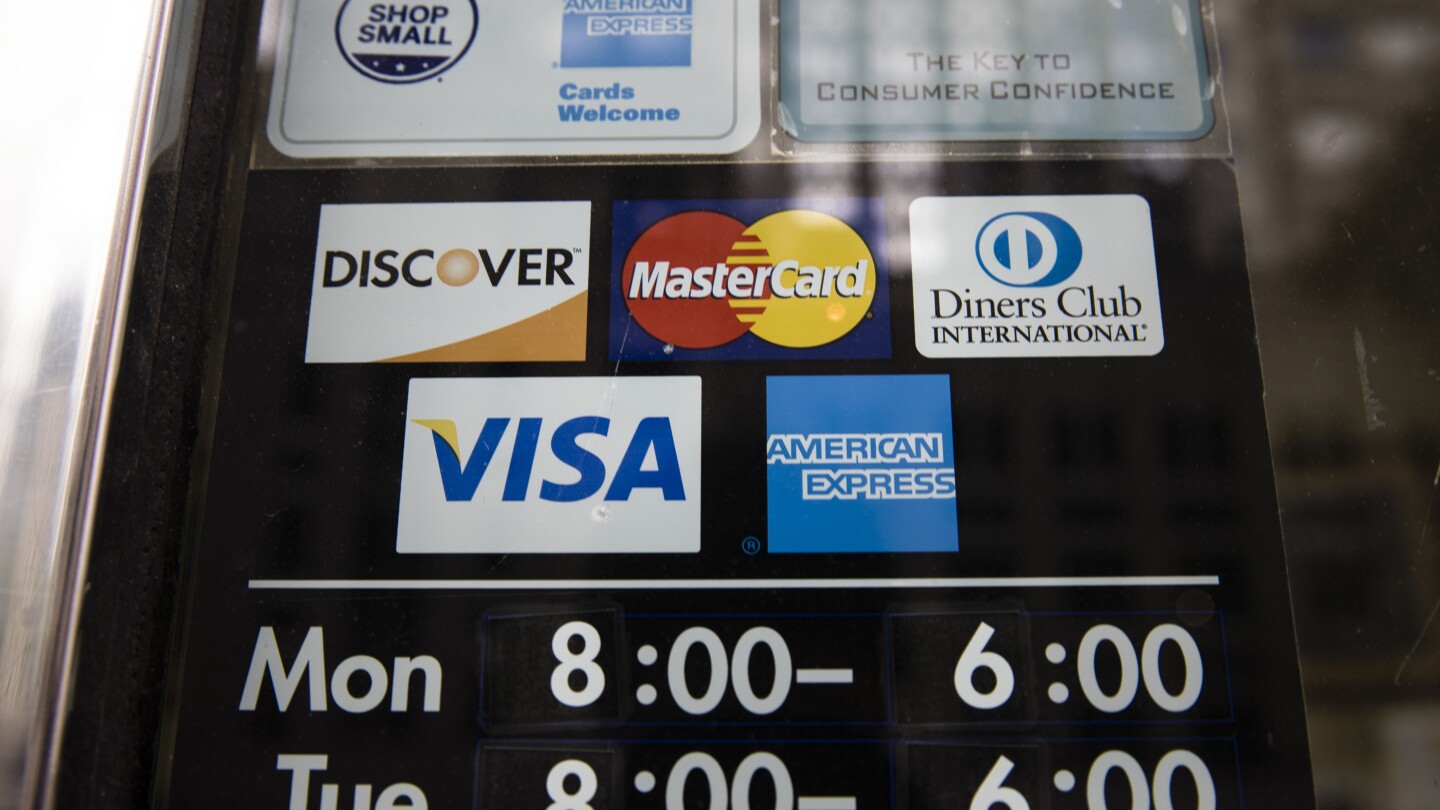While the U.S. economy is broadly healthy, pockets of Americans have run through their savings and run up their credit card balances after battling inflation for more than two years.
Experts worry that members of these groups – mostly lower- and middle-income Americans, who tend to be renters – are falling behind on their debts and could face further deterioration of their financial health in the year ahead, particularly those who have recently resumed paying off student loans.
“The U.S. economy is currently performing better than most forecasters expected a year ago, thanks in large part to a resilient consumer,” wrote Shernette McLoud, an economist with TD Economics, in a report issued Wednesday. “However, more recently that spending is increasingly being financed by credit cards.”
Americans held more than $1.05 trillion on their credit cards in the third quarter of 2023, a record, and a figure certain to grow once the fourth-quarter data is released by Federal Deposit Insurance Corp. next month. A recent report from the credit rating company Moody’s showed that credit card delinquency rates and charge-off rates, or the percent of loans that a bank believes will never be repaid, are now well above their 2019 levels and are expected to keep climbing.
…
Most analyses of Americans’ financial health tend to tell a tale of two consumers. On one side are the roughly two-thirds of Americans who own their homes and those who’ve invested in the stock market and done substantially well. They generally had the savings cushion necessary to weather high inflation. Delinquency rates on single-family homes remain at near historic lows and home prices have continued to climb.
But for the rest of America, things are looking rough.
If this economy is healthy you’re using bad metrics.
I had a philosophy prof in college who had a pet peeve about movie buffs who use box office numbers as a metric of success. It makes sense for the people profiting to look at it like that, but it killed him cinephiles would adopt that perspective to quantify success over other more artistic markers of a well-made film.
Or a narrow definition of “broad”.
The moment something becomes a metric it ceases to be a useful metric.
"VantageScore’s Tavares worries that the recent reintroduction of student loan payments could more acutely impact these customers in their ability to repay their debts.
“Folks are scrambling to pay these obligations that they haven’t had to pay in three years, and it’s hitting exactly the demographic we are talking about here: the younger folk, less affluent folk,” Tavares said."
The loans thing she doesn’t help, but it’s the rampant and blatant price gouging for consumer goods that is a huge culprit. But no one seems willing to talk about or address that.
The loans thing she doesn’t help, but it’s the rampant and blatant price gouging for consumer goods that is a huge culprit. But no one seems willing to talk about or address that.
Thats because they assure us inflation is under control. Though, its easy to say that when CPI numbers are continually massaged.
Jerome Powell should be tarred and feathered.
Actually (“ECKKTUALLY?”) inflation has come down in a big way in most areas. Food is still high, but gas and other commodities have seen huge drops. The job market is strong and the stock market is more robust than it ever has been. But people tend to overlook those things when they aren’t getting more money into their wallets…naturally.
You’re getting downvoted but are also totally correct. Prices for all sorts of stuff have come way down, eg cars, gas, lumber, electronics, but people don’t tend to buy these things as often as groceries, which are still elevated, so it still feels pervasive. Add this on to crippling socioeconomic inequality and there’s certainly a recipe for dissatisfaction here though
That doesn’t bother me, I know when I’ve being downvoted it’s because I’ve said something truthful that people dont want to hear. If all I wanted was being upvoted, that would pretty much defeat the whole purpose of being on social media. I certainly don’t come here for the “approval” stamp.
There is still crippling socioeconomic inequality, but there has been ever since I’ve been alive and I’m almost 65 now. And there’s always been dissatisfaction over it, and large contingents of people unwilling to accept any positive news of the economy because they have gripes about some parts of it.
If 2/3 of people can afford to pay the higher prices for basic necessities and 1/3 cannot it’s not difficult to see the direction things will move.
In capitalism agency=price discrimination and when some people are willing to pay 300% for potatoes and milk the people who cannot are SOL, and increasingly so as things progress. Obviously the manufacturers will set the price to wherever they’re profiting the most. This is also why inequality throws a wrench in the myth of well functioning capitalism.
Either governments need to step in or people who can afford to pay 300% need to refrain on principle (the latter seems pretty unlikely on a mass scale).
or people who can afford to pay 300% need to refrain on principle
We couldn’t even get people to wear masks during a pandemic. You think we can get people to stop buying shit they can afford at extortion rates? GPU market already shows how that worked.
Ding ding ding! Nailed it!
Well, my situation anyway. And now I’m looking at skipping multiple payments because my new (to me) car has multiple problems that can’t be babied along anymore.
deleted by creator
Powell and Yellen have fucked America
Greedy corporations and billionaires have fucked us
Same team
I’m old enough to remember both Powell and Yellen gaslighting the American public on inflation for years
This is just false
Americans “have become saddled” with credit card debt? Excuse me being a lecturing boomer, but that makes it sound like credit cards attacked them and forced them to have more debt. Americans make a choice to use credit cards and go into debt, and that is how credit card companies make their money but - you aren’t forced to become “saddled” with them. It’s your own bad habits that make you go into debt.
While I’m on my soapbox (and opening myself up for nasty retaliatory responses), I was in a game store not long ago to trade some games in, and there were several young guys in front of me. Each one wearing tattered clothes and looking like they hadn’t eaten in weeks. All of them buying new PS5s on their credit cards.
I’m not saying it’s not okay to indulge, and I’m not saying I know these people’s life stories. Maybe they can easily afford the payments and won’t get behind - but it’s a hard lesson to learn, to go into debt without the ability to keep up and pay it back. You young credit card considereres - beware. It’s a trap to think you will somehow magically be able to pay these debts off, and it can ruin your credit history for good.
Americans make a choice to use credit cards and go into debt, and that is how credit card companies make their money but - you aren’t forced to become “saddled” with them.
You matured enough to understand the personal finance concepts of debt and the risks associated with it, but you stopped maturing there and don’t realize that your circumstances and choices don’t match everyone else’s.
It’s your own bad habits that make you go into debt. Americans “have become saddled” with credit card debt? Excuse me being a lecturing boomer, but that makes it sound like credit cards attacked them and forced them to have more debt.
“I’m sorry Jenny. I know you’re in pain but I don’t have the cash for the $65 co-pay for you to see the doctor, and if put it on my credit card, I won’t be able to pay off the statement balance to avoid interest in time.”
“Whats that Sean, you’re hungry? We have to go without dinner tonight because I have enough cash to pay rent, but not pay rent & buy food. Buy food on my credit card? Don’t you understand that the variable rate on my card is 23.5% which means if I buy $20 worth of food I’ll incur a 39 cent finance charge next month because I can’t pay it off. So the better decision here is for us to go hungry tonight.”
“Boss, what do you mean I’m fired for not coming into work?! I know I haven’t shown up for a few days, but my car broke down and I don’t have the $1200 cash on hand to repair it. Sure, I have a credit card, but perhaps you’re not aware, but carrying a balanced means extra debt. I refuse to be ‘saddled’ with credit card debt. Hello? Hello?!”
Not everyone that has credit card debt is a spendthrift. Now, I’m not saying that all Americans that are cited in the article are represented in the scenarios I painted above. Are there those that spend frivolously? I’m sure there are. However, the article talking about macro economic trends which accounts for that fraction. With the increased cost of living, increased inflation in the past few years in critical areas such as food and housing, it is not surprising that many American’s spending is being pushed past their income resulting in credit card debt rising.
You don’t carry credit card debt. I don’t either. Instead of assuming that what we have is the norm, understand what incredible luck we have to have avoided so many of life’s pitfalls to end up where we are, and not everyone is as lucky as we are.
I don’t care how hard you worked or saved to get where you are. Huge amounts of any success you have today is the result of luck. Recognize that is out of your control and out of the control of others for themselves.
You young credit card considereres - beware. It’s a trap to think you will somehow magically be able to pay these debts off
This is good advice, but would any of your intended audience trust your words at this point with your “holier than thou” messaging written before you wrote this?
Perhaps your next step of mature is to learn empathy.
Sounds good to me.
You need to establish credit in order to participate in the society that we created. You can’t rent an apartment, get a house, get a vehicle, etc, without credit history.
True, but the point is establishing responsible credit history. If you’re not spending within your means, it’s time to make adjustments. It’s not to say that things don’t come up, especially now that medical costs are one of the primary reasons for going into debt, but it’s certainly possible to live on the poverty line without going into debt.
And if that credit history is ruinous and terrible, you can’t rent an apartment, or get a house, or buy a vehicle. Credit history is important but it’s also something you have to be taught how to achieve in a responsible way.
Credit history is important but it’s also something you have to be taught how to achieve in a responsible way …
… if you’re allowed to.
'Cause there’s a whole section of the economy that pushes against the average person trying to join in.
I can understand where you’re coming from, I’ll offer you a perspective from a “relatively young” person who luckily doesn’t have CC debt yet, and who has friends who keep falling into financial traps and need to have their family bail them out multiple times.
I’m a bit of a miser/spendthrift in daily life, I travel by train for fun but I also don’t get anything on the card I can’t pay off by the end of the month.
At the same time, everyone, young and old, now have to sidestep more tricks to get you to spend more to live a normal life. Let me name a few:
- Those “Pay over X months” schemes that make you think you can spend more in a month because you forget about the obligation over the time period. They were uncommon before recent times but they are in your face everywhere now!
- Tip amounts appearing in more places than they need to be, and increasing over the last 5 years. I always put in a custom number doing mental math, as if I were paying cash, unless I have a separate cash tip on hand.
- Basic necessities near-doubling in price over the last 5 years. Costco saves my ass here, but I still go in without a cart so I don’t buy more than what fits in two hands which roots out most unnecessary things.
- Everything becoming a subscription of some sort. I bill everything I can annually but have a budget for all monthly expenses. It’s designed to make people forget they’re being bled dry every month.
- Deregulation of online gambling and related ads to make you lose money on average. Luckily none of my friends gamble but hot damn do they encourage the mindset of putting money on nothing.
A person is BOMBARDED with these various schemes in their daily life, many of which aren’t in their control, in addition to your typical credit hustling through letters and in person chats from banks, predatory payday loans and car payments.
At what point does it stop becoming an individual’s responsibility, so that we can address these greedy schemes that plague our society?
I don’t say it isn’t greed and it isn’t shifty practice on the part of credit card companies, and some are worse than others, but I’m just hoping to help people steer clear of the temptation to use credit cards if they haven’t the money in the bank to pay them off.
It IS a big responsibility of credit card companies to not be usurious with their interest rates, but let’s be real - that’s never going to change. It’s what they do.
Basic necessities are always going to go up, because manufacturers know they have us by the short hairs and can yank us around anyway they please, and people will still cough up the money. They do that with gas prices all the time, raising them when travel is more likely just because they can.
IT’s a sad truth that the world we live in is full of deliberate traps to make you a debtor as much as possible. Then once you are in debt, it’s full of ways for creditors to harrass and bully you for it.
Totally agreed with you. Credit cards used effectively can be beneficial to people, but those companies make money off of the people that aren’t careful with it.
Also I want to thank you as your original comment provided inspiration for me to make an AskLemmy post about this kind of thing:
I wish I had had instructive help on when and how to use credit cards when I was younger. I did go into debt and so I know how it happens and see how easily it lures people in. So I’m glad you’re putting energy into creating a post about it and helping getting the word out.
For me, credit cards were a too-attractive lure and they ensnared me when I was least able to understand how negatively impactful they could be. So I hope getting the information out to others will help them avoid the same pitfalls. Frankly, a bank debit card is useful but most credit cards are probably best avoided if possible.









